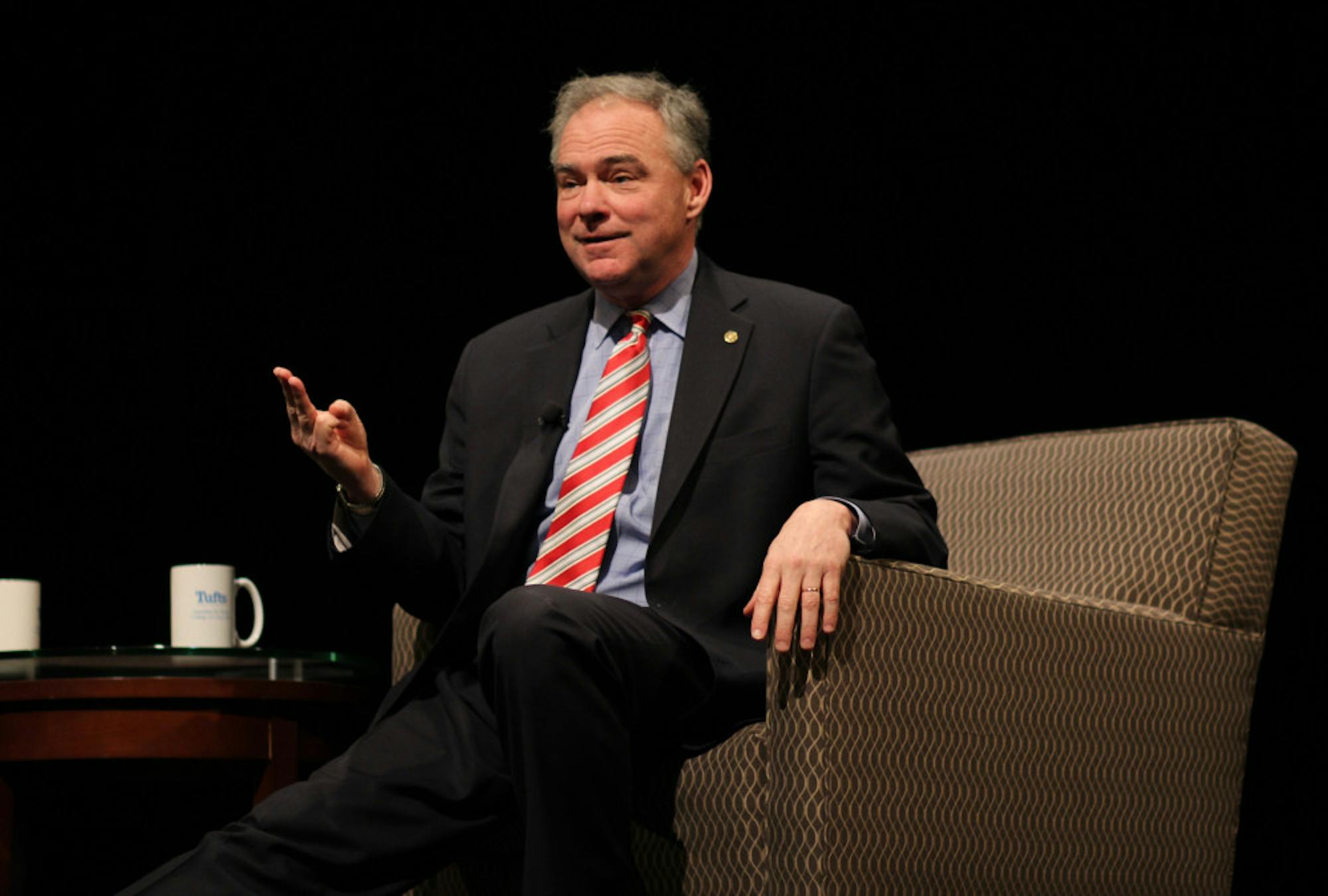U.S. Senator and 2016 Democratic Vice Presidential nominee Tim Kaine (D-VA) reflected on last year's presidential election and gave his prognosis for the future of the Democratic party, speaking in a mostly-full Cohen Auditorium on Monday morning.
The talk, which was part of the Jonathan M. Tisch College of Civic Life's Distinguished Speaker Series, was moderated by Dean of Tisch College Alan Solomont. Following introductions by Solomont and University President Anthony Monaco, Kaine and Solomont began by discussing Kaine's entry into public service.
Kaine said that he was initially drawn to public service by his Catholic upbringing. In particular, he took a year off from Harvard Law School to conduct missionary and charitable work in Honduras, a move that he said was formative to his future endeavors.
"It was a very very challenging environment that challenged so many preconceptions I had about life, and taught me how sheltered I was in my experiences," Kaine said. "That then made me return the next year to law school very focused on using my limited gifts to try to help others."
Kaine said he was disappointed that he and Secretary Hillary Clinton lost the presidential election last November. He added that the initial disappointment melded into larger concerns about President Donald Trump's incoming administration.
However, he added that his and Clinton's failure has motivated him to continue working in the Senate. He noted that he is especially eager to fight to "save health insurance," referring to Trump and congressional Republicans' ongoing push to repeal the Affordable Care Act.
Kaine said he is optimistic that, in response to Trump's ascension to the presidency, naturally altruistic people will become more politically active for progressive causes. He cited the Women's Marches, which drew hundreds of thousands of protesters in many cities worldwide on Saturday, as evidence of an increase in civic activism.
Kaine urged Democrats to focus more on local and grassroots politics. In particular, he argued that a focus on state elections in 2018 could give Democrats a more favorable position in the congressional redistricting that will take place after the 2020 Census.
He also hoped that Senate Democrats will continue to have a strong minority, if not a majority, after the midterm elections, which will help them exert influence over important matters.
"Even if I can't defeat the [cabinet nominees] I'm concerned about, I can put on the table in the light of day some really important issues," Kaine said. "And by putting it on the table in the light of day, you can sometimes put up a guardrail against some abuses."
Kaine voiced his opposition for Secretary of State nominee and former ExxonMobil CEO Rex Tillerson two weeks ago, warning that Tillerson's loyalties may still lie primarily with ExxonMobil, according to a press release on Kaine's website.
Additionally, Kaine worried that Americans have an increasing tendency to self-sort based on political and ideological views, which he said has deepened political polarization. In reaction to this, Kaine insisted that Democrats stand firmly for their beliefs but remain willing to listen to other points of view.
"You can be firm in your positions, but you don't have to exhibit malice towards those who have different positions," Kaine said.
Next, the conversation shifted to foreign policy. Kaine said he is concerned about what he perceives as a lack of a unifying foreign policy strategy since the end of the Cold War. He argued that the United States should not encourage democracy worldwide by force but rather by example, which requires citizens to reflect on the flaws in American democracy.
Towards the end of the talk, Kaine took several questions from students in the audience.
When asked how he believes Democrats should proceed during Trump's presidency, he rejected the notion that obstructionism is a workable strategy. He said he would like to continue to take action, and he warned that by criticizing Republicans continually, Democrats' critiques might become devalued and the Republican majority could strip Democrats of their filibuster power.
Kaine ended the talk by proposing a vision for the Democratic Party. He acknowledged that the party is somewhat divided on economic policy, but he pointed out that there is near-consensus on social issues such as marriage equality. He argued that the Democratic Party is unified by a sense of altruism, though he views it as an underdog party by nature.
"We're going to have to battle over some economic policy issues and the role of America in the world," Kaine said. "But at the bottom ... we're kind of underdog people, and we really need to reclaim that mantle and be true to it."
Tim Kaine speaks at Tufts in Tisch College event






